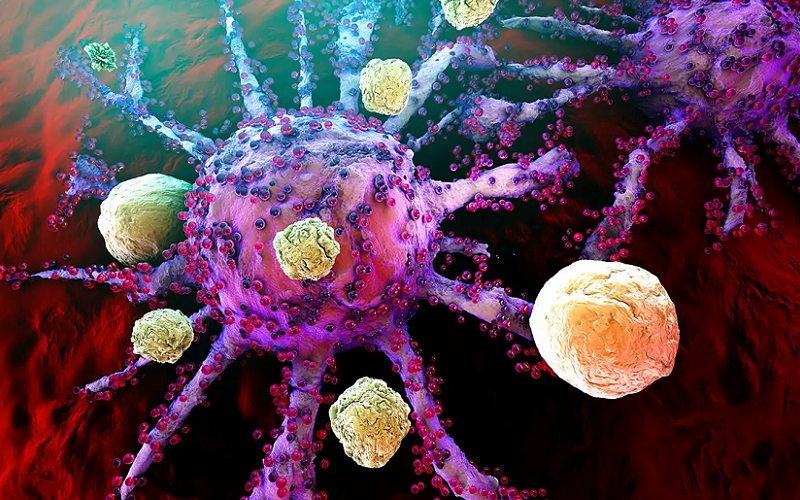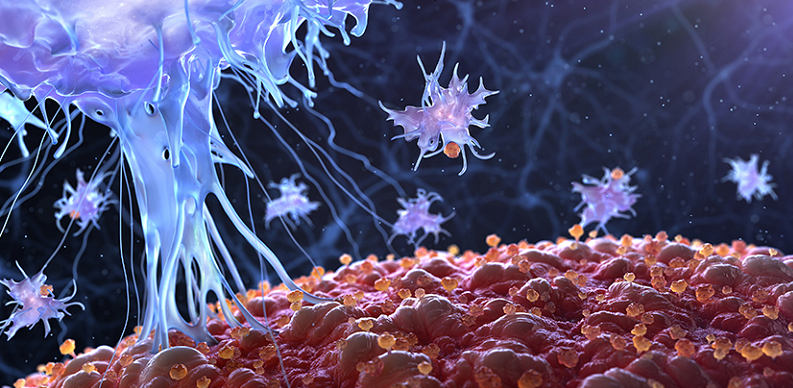
In the intricate dance of molecules that sustain life, thymosins stand out as unsung heroes. Primarily recognized for their pivotal role in the orchestration of our immune responses, these peptides have recently entered the spotlight for another tantalizing reason: their influence on the brain. Journeying into the realm of thymosins offers insights into the delicate interplay between our immune system and neural functions
Contents
- Historical Background of Thymosins
- Thymosins and Immunity
- Neural Modulation: An Emerging Area of Thymosins Research
- Therapeutic Implications and Future Thymosins Research
- References
Historical Background of Thymosins
The tale of thymosins begins not in the recent decades but dates back to the mid-20th century. Like many groundbreaking discoveries in science, the understanding of thymosins has been an evolving story, marked by periods of eureka moments and persistent inquiries.
Discovery and Initial Research of Thymosins
In the 1960s, Dr. Allan Goldstein from the George Washington University formulated a series of experiments to study the thymus gland, a small organ nestled behind our breastbone. The thymus was known for its immune-related functions, but its deeper molecular secrets were yet to be revealed. Goldstein’s work led to the identification of a series of peptides, which he fittingly named “thymosins,” derived from the thymus gland.
These initial studies hinted at the peptides’ role in the development of T-cells, a type of white blood cell essential for adaptive immunity. The excitement in the scientific community was palpable. Here was a molecule that could potentially shed light on the intricacies of our immune system.
Evolution of Understanding of Thymosins in the Field of Medicine
As research progressed through the 1970s and into the 1980s, it became apparent that thymosins weren’t just singular entities but a family of related peptides. This realization expanded the horizons of research, as scientists began to tease apart the different functions of each thymosin variant.
Moreover, while the initial focus remained squarely on their role in T-cell maturation, newer studies began to uncover other facets of their function. Some researchers reported their influence on wound healing, while others observed their potential anti-inflammatory properties.
The 1990s and early 2000s saw a surge in investigations around thymosins’ potential therapeutic applications. Beyond just understanding their natural roles, scientists were now keen to harness these peptides in combating diseases, particularly those of immune origin [1].

Thymosins and Immunity
Immunity, the body’s defense system against pathogens and potentially harmful invaders, stands as one of the most complex yet elegant mechanisms in biology. At the heart of this system are T-cells, a type of lymphocyte that orchestrates immune responses, distinguishing friend from foe. Thymosins, as we’ve learned from their initial discovery, have a pivotal role in the world of immunity, particularly in the arena of T-cell maturation and function.
Role in T-Cell Maturation
The thymus gland, despite its modest size, is a powerhouse of immune cell production and maturation. Within this gland, thymosins play a starring role, ensuring that T-cells are primed and ready to defend the body.
Definition of T-Cells
T-cells, or T lymphocytes, emerge from the bone marrow and mature in the thymus. They are a crucial component of our adaptive immunity, which is the portion of our immune system that “learns” and “remembers” specific pathogens. This means that if we’re exposed to a particular virus or bacteria once, our T-cells can recall this invader and swiftly mobilize a defense upon subsequent exposures.
Importance in Adaptive Immunity
Thymosins, especially thymosin beta-4, have been shown to be instrumental in the differentiation of precursor cells into functional T-cells. Without the guiding influence of thymosins, T-cells would not mature correctly, leaving our adaptive immune responses in disarray and our bodies vulnerable to repeated infections.
Activation and Mobilization of Precursor T-Cells
While the maturation of T-cells is vital, it’s just the start of the thymosins’ work. Once T-cells are matured, thymosins help ensure they are ready for action whenever the body sounds the alarm of an invasion.
Mechanism of Action
Upon a perceived threat, thymosins aid in the activation and migration of T-cells from the thymus to the sites of infection or inflammation. They essentially act as molecular “coaches,” urging the immune cells to their optimal locations and states of readiness.
Implications for Immunodeficiency Diseases
In conditions where the immune response is compromised, such as certain immunodeficiency diseases, the importance of thymosins becomes even more pronounced. The potential therapeutic use of thymosins to bolster the immune response in such conditions is a topic of ongoing research and offers a beacon of hope for affected individuals [2].
Other Immune-Related Functions
Beyond the world of T-cells, thymosins have their fingers in several other immune pies, showcasing their multifaceted roles.
Effects on Macrophages and Other Immune Cells
Macrophages, the body’s cellular “clean-up crew,” are also influenced by thymosins. These peptides enhance the ability of macrophages to engulf and destroy pathogens, further solidifying the immune system’s defenses. Furthermore, thymosins have been shown to impact other immune cells, like B-cells and natural killer cells, expanding their repertoire of influence.
Role in Wound Healing and Tissue Regeneration
Interestingly, thymosins, particularly thymosin beta-4, have been implicated in processes outside of direct immune responses. Their role in wound healing and tissue regeneration is a testament to their versatile nature. By modulating the inflammatory response and promoting cellular migration to injury sites, thymosins accelerate the body’s natural healing processes.

Neural Modulation: An Emerging Area of Thymosins Research
Our understanding of thymosins, initially rooted in the realm of immunology, has now blossomed to embrace the intricate world of neuroscience. Recent revelations suggest that these peptides are not confined merely to bolstering our immune responses but might also be whispering secrets to our brain cells. Neural modulation by thymosins is a budding area of research, and though the chapter is still being written, the early paragraphs are filled with promise.
Thymosins in the Central Nervous System (CNS)
The central nervous system, composed of the brain and spinal cord, is the epicenter of our thoughts, emotions, and perceptions. Discovering the presence and activity of thymosins in the CNS has been nothing short of a scientific revelation.
Presence in Various Brain Regions
Contrary to initial beliefs that thymosins were exclusive to the thymus and peripheral tissues, recent studies have detected these peptides in multiple brain regions. From the hippocampus, crucial for memory formation, to the cortex, responsible for complex thinking, thymosins appear to be more involved in neural processes than we once imagined [3].
Interaction with Neurotransmitter Systems
Neurotransmitters are the chemical messengers of the brain, facilitating communication between neurons. Preliminary findings suggest that thymosins may interact with several neurotransmitter systems, potentially influencing processes like mood regulation and cognitive function. The exact mechanisms and implications of these interactions are still under investigation, but they undoubtedly open a new avenue of understanding for thymosin research.
Potential Neuroprotective Effects
As the plot thickens in the thymosin narrative, there’s emerging evidence to suggest that these peptides might don the hat of neural guardians.
Animal and Cell Culture Studies
Several animal and cell culture studies have hinted at the neuroprotective effects of thymosins, particularly thymosin beta-4. In scenarios of oxidative stress or injury, thymosins appear to mitigate cellular damage and promote neuronal survival. Such findings have spurred interest in their potential therapeutic applications for neurodegenerative conditions.
Possible Mechanisms of Protection
The pathways through which thymosins exert their neuroprotective effects are still being mapped. However, early insights point towards their role in reducing inflammation in the brain, modulating cellular stress responses, and even promoting neural regeneration. These mechanisms are all essential for maintaining a healthy neural environment, especially as the brain ages or faces external threats.
Thymosins and Memory Modulation
Beyond mere protection, could thymosins also influence the very essence of our cognitive processes? The emerging answer appears to be a tentative “yes.”
Role in Synaptic Plasticity
Synaptic plasticity is the brain’s ability to strengthen or weaken synaptic connections in response to experiences. It’s the foundation of learning and memory. Some preliminary studies have indicated that thymosins, especially in the hippocampal region, may modulate synaptic plasticity, potentially influencing how we learn and retain information.
Implications for Cognitive Health
With aging and certain neurological conditions, cognitive functions can decline. If thymosins indeed modulate memory processes, there’s potential for their therapeutic use in enhancing cognitive health. It’s a prospect that could reshape our approach to conditions like Alzheimer’s disease or age-related cognitive decline [4].
Therapeutic Implications and Future Thymosins Research
As the multifaceted roles of thymosins come to light, one cannot help but wonder about the practical applications of such knowledge. Indeed, the implications of thymosins’ functions, both in immunity and neural modulation, are vast and potentially transformative for therapeutic science.
Potential Applications in Immune Disorders
The immune system, with its delicate balance of responses, is susceptible to various disorders when this equilibrium is disturbed. Thymosins, given their central role in immunity, offer therapeutic promise in this domain.
Immunodeficiency Conditions
For patients grappling with conditions that weaken the immune system, thymosins might be a beacon of hope. By potentially enhancing T-cell maturation and function, thymosins could offer a novel avenue to bolster the body’s defenses, ensuring a more robust response to pathogens.
Autoimmune Diseases
On the flip side, autoimmune diseases, where the immune system mistakenly attacks the body’s own cells, present another therapeutic challenge. Research is ongoing to discern if thymosins could help recalibrate the immune system, restoring balance and preventing self-inflicted damage.
Neurological and Cognitive Disorders
As we’ve unearthed the neural modulation capabilities of thymosins, the door to their potential neurotherapeutic applications has inched open.
Neurodegenerative Diseases
Conditions like Alzheimer’s and Parkinson’s disease, characterized by progressive neuronal loss, might benefit from thymosins’ neuroprotective effects. If thymosins can indeed shield neurons from damage and promote regeneration, they could become pivotal in the fight against neurodegeneration [5].
Cognitive Enhancement and Recovery
Beyond neurodegeneration, there’s the exciting prospect of thymosins in cognitive enhancement. Whether it’s combating age-related cognitive decline or aiding recovery from brain injuries, thymosins might offer a therapeutic edge, given their role in synaptic plasticity and memory modulation.
Wound Healing and Tissue Regeneration
Outside the realms of immunity and neural function, thymosins’ role in tissue repair remains an exciting therapeutic avenue.
Post-Surgical Recovery
Promoting faster wound healing can be particularly beneficial post-surgery. By harnessing thymosins, especially thymosin beta-4, medical professionals might be able to expedite the healing process, reducing recovery times and enhancing patient outcomes.
Chronic Wound Treatment
For individuals with conditions that hinder the natural healing process, such as diabetes, thymosins could offer a potential solution. Their ability to modulate inflammation and promote cellular migration to wound sites might revolutionize chronic wound management.
A Glimpse into the Future: What Lies Ahead?
While the therapeutic promise of thymosins is vast, the journey of scientific inquiry is far from over. Many questions remain unanswered.
- How can we best harness these peptides for therapeutic use?
- Are there potential side effects or long-term implications of thymosin-based treatments?
- Can we develop synthetic analogs that might offer enhanced benefits or specificity?
The future of thymosin research is poised at a thrilling juncture, with both challenges and opportunities on the horizon. As we continue to decode
References
[1] Thymosin alpha-1 modulate excitatory synaptic transmission
[2] Regulation of Neuroendocrine Pathways by Thymosins
[3] Immunopotentiator Thymosin Alpha-1 Promotes Neurogenesis
[4] Thymosin β4 reverses phenotypic polarization of glial cells and cognitive impairment
[5] The Promotive Effects of Thymosin β4 on Neuronal Survival

